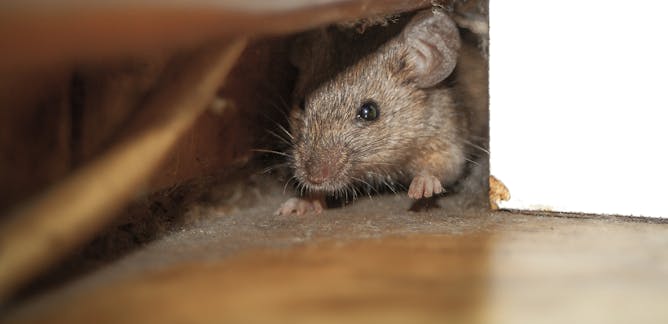
Articles on Mice
Displaying 1 - 20 of 43 articles

An evolutionary biologist is studying what these resilient urban pests can teach us about adaptation and evolution.

On a small, remote island in the Pacific Ocean, an unlikely predator feasts on the world’s largest albatross colony. Researchers are trying to figure out how to stop these murderous mice.

The benefits of snake populations on agricultural land far outweigh the potential costs, and farmers should tolerate rather than kill them.

There’s shocking new evidence of rodenticide poisoning in Australia’s nocturnal predatory birds. High concentrations of the active ingredients were found in 92% of the 60 dead birds they tested.

Clinical trial funders now insist studies use female participants. But it will still take a long time for our understanding of how medicine affects women to catch up.

Rodents destroy around 70 million tonnes of grain each year. What if we could trick them into looking elsewhere for their food?

Rodents are the most numerous – and least studied – of all Earth’s mammals.

We dug into what was behind the headlines on nose-picking and dementia so you don’t have to. Here’s what the study really says.

With temperatures plunging, rodents have started seeking the warmth and food inside our houses. Here’s how to deal with them effectively and humanely – without accidentally catching native animals.

Growing applications of nanotechnology include using nanorods for male birth control. The technique has had some success in animals, and offers the potential of human male contraception.

Researchers are testing an antibody shot to protect people from Lyme disease-causing bacteria.

Imagine constantly living with mice. When you go to sleep they run across your bed, the stench of dead mice fills the street. As an expert on mouse outbreaks, let’s look at the issue in more detail.

Medical research to benefit people is first conducted in animals. Creating a new biomedical model by inserting human immune cells into pigs may lead to new insights and treatments.

Discovering a mouse with a reproductive system surprisingly similar to our own is good news for pregnancy research.

Fungi are a small but important part of the gut microbiome. A new study in mice shows that how much weight mice gain on a processed food diet depends on this fungal microbiome.

Scientists are experimenting with using dogs to sniff out people infected with COVID-19. But dogs aren’t the only animals with a nose for disease.

Mice pups living on mountain tops reserve their energy for growth rather than warmth. When they get too cold, they conserve energy by slowing down their metabolic processes.

Animals that regularly dine on toxic food may hold clues for designing new drugs to treat persistent pain in humans.

If all, or even most, offspring of the survivors are shy, we could be facing an introduced pest population that is incredibly difficult to remove.

Framing cats as responsible for declines in biodiversity is based on faulty scientific logic and fails to account for the real culprit – human activity.
